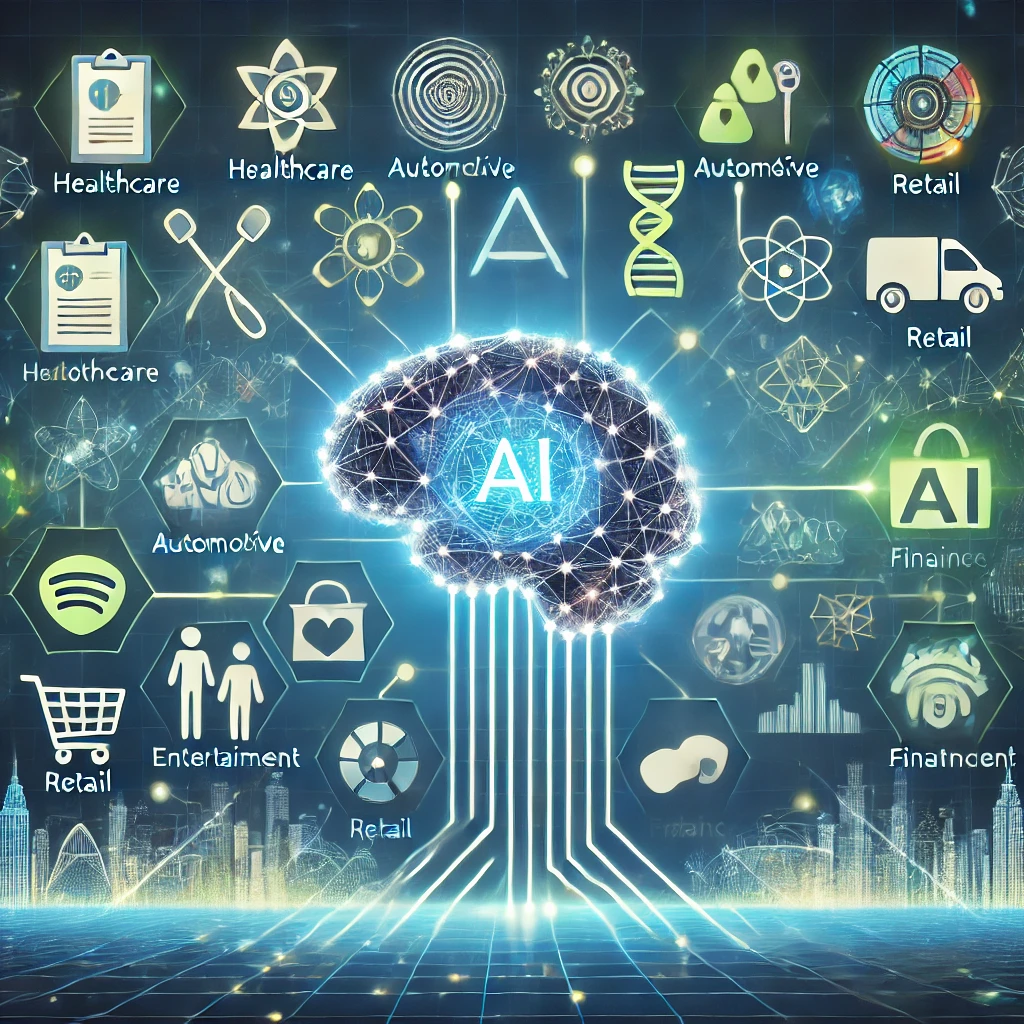Generative AI is rapidly transforming industries and reshaping business landscapes across the globe. By offering innovative solutions to complex challenges and enabling new opportunities, generative AI is a powerful tool that businesses are adopting to stay competitive in today’s fast-evolving market. In this article, we will explore the benefits, real-world use cases, and long-term impacts of generative AI on business.
What is Generative AI?
Generative AI refers to a class of artificial intelligence technologies capable of creating new content such as text, images, audio, and even videos by learning from existing data. Unlike traditional AI, which focuses on tasks like classification and recognition, generative AI is designed to produce new, original outputs based on patterns and information it has learned. As a leading generative AI development company, we specialize in creating customized AI solutions that empower businesses to automate processes, enhance customer experiences, and drive innovation. With cutting-edge technology and industry expertise, we help organizations unlock the full potential of generative AI to solve complex problems and achieve scalable growth. Whether you’re looking to streamline operations, personalize customer interactions, or develop new AI-driven products, partnering with a trusted generative AI development company can provide the competitive edge needed to stay ahead in the market.
Benefits of Generative AI for Businesses
Generative AI is increasingly being adopted by organizations across industries due to its numerous benefits. From boosting efficiency to driving personalization and cost-saving, here’s a deeper dive into how generative AI is benefitting businesses.
1. Increased Efficiency and Automation
One of the primary benefits of generative AI is its ability to automate complex tasks, which improves overall efficiency. Tasks that traditionally required extensive manual effort—such as content creation, data analysis, and product design—can now be automated with AI, allowing companies to save both time and resources.
- Marketing: Generative AI can produce tailored marketing materials at scale, such as customized emails, social media posts, and advertisements. This allows businesses to reach their audience more effectively, without requiring manual effort for each piece of content.
- Product Development: In industries like manufacturing, generative AI is used to design product prototypes and iterate on designs in a fraction of the time it would traditionally take.
Automation not only saves time but also reduces human error and allows businesses to scale operations efficiently.
2. Enhanced Decision-Making with Data Insights
Generative AI can process large datasets and generate predictive models, helping businesses make more informed and strategic decisions. Whether it’s forecasting sales trends, optimizing inventory management, or identifying customer behavior patterns, AI-powered insights provide the data-driven decision-making that businesses need to stay competitive.
For instance, businesses in the retail sector can use generative AI to analyze customer behavior, allowing them to tailor product offerings, pricing, and marketing strategies for maximum engagement.
3. Personalization at Scale
In today’s competitive market, consumers expect highly personalized experiences. Generative AI enables businesses to meet these expectations by delivering tailored content and services at scale. By analyzing customer data, generative AI can help companies create individualized marketing campaigns, product recommendations, and even dynamic pricing models.
- E-commerce: AI can recommend products based on individual browsing and purchase history, improving conversion rates.
- Customer Support: AI-powered chatbots offer personalized, round-the-clock customer support, enhancing the customer experience while reducing costs.
Personalization is no longer limited to small businesses with bespoke offerings; generative AI allows even large corporations to offer unique, targeted experiences to each customer.
4. Cost Reduction
While the initial investment in generative AI tools can be high, the long-term cost benefits are significant. By automating routine tasks, businesses can reduce labor costs. AI can also optimize operations, such as supply chain management and inventory control, minimizing waste and improving profitability.
Generative AI’s ability to identify inefficiencies in processes can also lead to cost-saving opportunities, improving a business’s bottom line.
Use Cases of Generative AI Across Industries
Generative AI has vast applications across various industries. Let’s explore a few sectors where generative AI is making a significant impact.
1. Healthcare
In healthcare, generative AI is revolutionizing patient care and medical research.
- Drug Discovery: AI models can predict molecular structures and generate new compounds, drastically speeding up the drug discovery process. By simulating how different compounds interact, generative AI can identify promising treatments for diseases faster than traditional methods.
- Medical Imaging: AI tools can enhance the quality of medical images, helping doctors identify diseases like cancer more accurately and quickly.
Generative AI is also being used to develop personalized treatment plans based on patient data, improving outcomes and patient satisfaction.

2. Marketing and Advertising
Marketing and advertising are among the most rapidly evolving fields where generative AI is playing a transformative role.
- Content Creation: AI tools are used to generate copy for blog posts, social media content, and even ads. These tools can create text in a brand’s voice, tailoring it for specific target audiences.
- Dynamic Ad Creation: AI can create personalized advertisements for different consumer segments, optimizing messaging and design in real time to maximize conversions.
This level of personalization and automation allows businesses to scale their marketing efforts without sacrificing quality.
3. Finance
Generative AI is being used extensively in the financial sector to enhance security, optimize investments, and automate services.
- Fraud Detection: AI systems can identify anomalies in financial transactions, flagging potential fraudulent activity before it causes harm.
- Predictive Analysis: AI tools are used to predict stock market trends and optimize portfolio management strategies based on vast amounts of historical and real-time data.
In the future, generative AI could revolutionize the way financial services are delivered, creating more personalized and efficient solutions.
4. Manufacturing
Generative AI is playing a crucial role in improving manufacturing processes.
- Product Design: AI can generate optimized product designs by analyzing materials, production costs, and performance data. This allows manufacturers to innovate rapidly while keeping costs low.
- Predictive Maintenance: AI models predict when equipment will fail, allowing manufacturers to perform maintenance before a breakdown occurs, minimizing downtime.
Generative AI’s ability to optimize production lines and supply chains is helping manufacturers improve efficiency and reduce costs.
The Impact of Generative AI on Business
Generative AI is not just about improving existing processes—it is about fundamentally transforming business models and driving innovation.
1. Transforming Business Models
Generative AI enables companies to offer new products and services that were previously impossible or impractical. For example, businesses in entertainment and media are using AI to generate content, such as music and art, which can be monetized or used to enhance customer engagement.
- AI-as-a-Service: Many companies are now offering generative AI as a cloud-based service, enabling other businesses to leverage AI tools without the need for significant upfront investment.
This new way of offering services is democratizing access to cutting-edge AI technology, allowing smaller businesses to take advantage of AI-driven innovations.
2. Fostering Innovation
Generative AI is driving creativity and innovation across industries by helping businesses explore new ideas and discover novel solutions to complex problems. From designing new products to creating entirely new business models, generative AI enables companies to explore possibilities they may not have considered otherwise.
3. Ethical Considerations
As with any new technology, generative AI brings with it ethical challenges. There are concerns about privacy, security, and the potential misuse of AI-generated content, especially when it comes to deepfakes or misinformation. Additionally, there is the risk of job displacement as AI automates tasks traditionally handled by humans.
Businesses must use generative AI responsibly, adhering to ethical guidelines and ensuring that the technology is used transparently and securely.
FAQs: Generative AI for Business
1. What are the main benefits of using generative AI in business?
Generative AI provides multiple benefits including increased automation, enhanced decision-making, cost reductions, and the ability to offer personalized experiences at scale. These capabilities allow businesses to improve operational efficiency, drive innovation, and deliver tailored products and services.
2. How can generative AI help businesses enhance customer experiences?
Generative AI helps businesses enhance customer experiences by enabling personalized marketing campaigns, dynamic content generation, and 24/7 customer support via AI-driven chatbots. These features create a more engaging and customized experience for customers, improving satisfaction and loyalty.
3. What industries are most impacted by generative AI?
Generative AI is making significant strides in industries like healthcare, finance, marketing, and manufacturing. Each sector is leveraging the technology in unique ways, such as using AI for drug discovery, fraud detection, content creation, and optimizing production processes.
4. How does generative AI contribute to cost savings in businesses?
Generative AI automates routine tasks, which reduces labor costs. Additionally, AI can optimize operations like inventory management and supply chain logistics, leading to cost savings. By identifying inefficiencies, businesses can streamline processes and improve profitability.
5. What ethical concerns should businesses consider when implementing generative AI?
Businesses must address issues like data privacy, algorithmic bias, and the potential for AI-generated misinformation. It is important for organizations to use generative AI transparently, responsibly, and in compliance with ethical standards.
6. How does generative AI improve decision-making in businesses?
Generative AI analyzes vast amounts of data to generate predictive models that help businesses make more informed decisions. Whether it’s optimizing inventory, forecasting sales, or predicting customer behavior, AI-driven insights provide a competitive edge in decision-making.
Conclusion
Generative AI is reshaping the future of business by unlocking new opportunities for efficiency, innovation, and growth. From automating tasks to providing data-driven insights, its potential is limitless. By leveraging generative AI, businesses can not only improve their existing operations but also explore new avenues for success. However, with this power comes responsibility—businesses must ensure that they use AI ethically and transparently to navigate the challenges it presents.
As generative AI continues to evolve, the businesses that embrace it will be the ones driving the future of industries worldwide.




